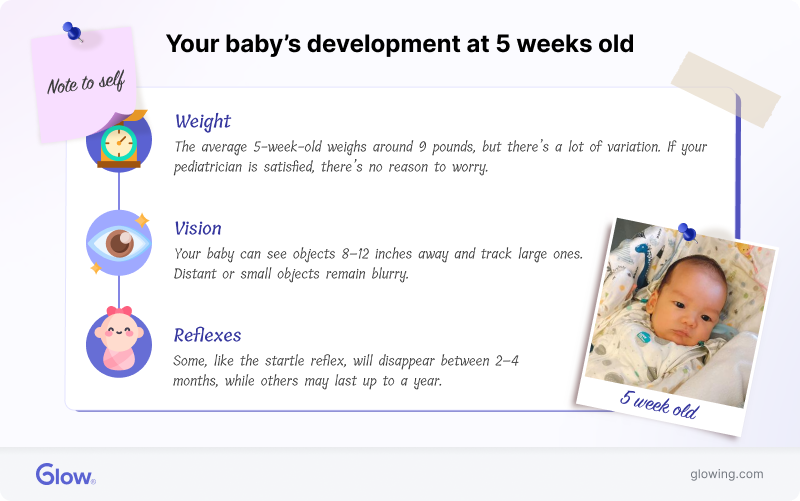Baby Month by Month
5-Week-Old Baby
Your baby may start turning his head towards you when he hears you.

With your baby now 5 weeks old, he’s still very little (and isn’t he the cutest?) He’s undergoing many changes, and as you settle into your new life with him, you may be anxious to know if he’s developing well, as well as how you can keep him healthy and happy.
In this article, we’ll explore what you can expect from your 5-week-old, from his developing communication skills and growth milestones to common health concerns. Let’s jump in.

Your baby’s development at 5 weeks old
Even though you know that all babies develop at their own paces, it’s only natural to wonder if your baby is growing “enough.” Here’s what you can expect from your little one’s growth at five weeks:
- Weight: The average 5-week-old weighs somewhere around 9 pounds. However, what’s considered “normal” is a broad range, and girls generally weigh a little less than boys. As long as your pediatrician is happy with your baby’s weight, there’s nothing to worry about.
- Vision: Your baby’s vision is still developing—he can only discern objects about 8 to 12 inches away and follow large objects with his eyes. Anything small or farther away will still be blurry.
- Newborn reflexes: Some of your little one’s newborn reflexes, like his Moro or “startle” reflex, will start going away soon, but the process isn’t complete yet. It’ll take 2 to 6 months for his Moro reflex to fade, and his other newborn reflexes, like his Babinski reflex, may linger on until he’s 12 months old. 1
Your baby’s communication and expressions
Your 5-week-old still relies on crying to communicate his wants and needs, but he’s also discovering new ways to express himself.
Finding his voice
Those adorable coos, gurgles, and grunts are more than just noises. Your baby is actively experimenting with his mouth, tongue, and throat to discover the sounds he can make.
You’re participating in his language development when you “talk back” to him, so keep it up.
Learning to listen and respond
Your baby is much more aware of the sounds around him. He’ll turn his head towards your voice and may quiet down or become more active in response to some sounds he has an affinity for. Pay attention to what sounds soothe or stimulate him.
Your baby’s eating habits
The rule of thumb is to allow your baby to drink as much milk as he wants, whenever he wants. At 5 weeks old, he should be getting roughly 16–24 ounces of milk in a full day, whether that’s breastmilk or formula. He should be drinking 2 to 4 ounces of milk every 2 to 4 hours. 2
If you’ve been breastfeeding instead of bottle-feeding him, you’ll likely notice that he’s feeding more consistently at the 5-week mark.
If you’re considering introducing an exclusively breastfed baby to bottle feeding, now’s a decent time to do so. Naturally, your little one will be initially curious about the new baby bottle and find it strange and new. Having someone other than the breastfeeding parent offer the bottle and making the experience positive and playful can help your baby become more used to it.
Tracking your baby’s bathroom breaks
At around 5 to 6 weeks, your baby is likely pooping noticeably less than before. Check with your pediatrician if you have concerns about the frequency, especially if his poop is hard or he hasn’t done a number two in five days. 3
It’s important to gauge whether he’s getting enough milk by tracking how often he wets his diapers during the day. If he’s eating enough, you should be changing at least 6 full diapers daily. 4
Vitamin intake
Whether your baby is breastfeeding or on formula, he’ll need a supplement of daily Vitamin D drops (around 400 IU). 5 If you’re unsure about supplements, your pediatrician will always be happy to set your mind at ease.
Your baby’s sleeping habits
At this stage, you and your baby are probably still figuring out his sleeping habits, routines, and wake windows. These may still seem chaotic, but don’t worry—you’re close to the light at the end of the tunnel.
Here’s what you should expect:
- Total sleep: Try not to worry about your baby sleeping too much, as your 5-week-old still needs around 15 and a half hours of sleep in 24 hours. He’ll log the majority of his sleeping hours (8 to 9) in bed at night. 6
- Nighttime sleep: With that said, don’t expect him to sleep through the night just yet. He likely won’t stay asleep for more than a 5-hour stretch at a time.
- Daytime naps: Expect your little one to take multiple naps throughout the day, totaling about 7 hours. 6 Daytime naps are as important as nighttime sleep—inadequate shuteye in the morning can make it harder, not easier, to put your baby to sleep in the evening.
- Baby witching hour: If your baby is overstimulated or overtired, he might get very fussy, especially in the late afternoon or early evening (a period that’s known as the “witching hour”). You can help him calm down by cuddling, gently rocking, and shushing him in a dimly lit room.
If he’s having consistent trouble sleeping, try to establish a sleep routine. Drawing a bath, playing soft music, and dimming the lights at a certain time can help your little one remember that it’s time for bed.
Common health concerns and what to watch out for
It’s good to be aware of the most common health concerns that pop up at this age. Keep an eye out for:
- Thrush: This common yeast infection may look alarming, but it’s easily treatable. Look out for white or yellow patches or sores in your baby’s mouth, and take him to the doctor if you spot any.
- Dry skin: Cold temperatures can dry out your baby’s skin. Use gentle, fragrance-free baby lotions to moisturize it.
- Colds: It’s easy for babies to catch colds, and your little one will eventually get a runny or stuffy nose, accompanied by coughing and sneezing. All of this is normal and unavoidable, but call your pediatrician if he develops a fever or is having trouble breathing, especially since cold symptoms can be similar to COVID-19. Never give tea or drugstore cold or cough medicines to your baby. 7 Moreover, babies can’t have honey until they’re a year old, so avoid that, too.
- Diarrhea: Runny poop can be caused by infections, antibiotics, or food sensitivities. Contact your pediatrician if he has diarrhea that doesn’t improve after a few days.
- Infant acne: Does your baby look like a spotty teenager? About 20% of babies develop neonatal acne (also known as baby acne). Though the cause is unknown, lingering pesky hormones from pregnancy could be partly to blame. 8 Neonatal pimples are usually harmless and won’t leave scars when they clear up on their own (by around 6 months old). 9 Just keep the affected areas clean by washing them with water, and don’t squeeze the pimples or apply any creams.
- Hernias: Hernias are fairly common in babies. Check for soft bumps in the groin (inguinal hernia) or belly button area (umbilical hernia). Umbilical hernias often go away on their own, but inguinal hernias require surgery. 10
- Strawberry hemangiomas: These may appear on your baby’s face, scalp, back, or chest, and will look like soft, raised, berry-like birthmarks. They usually grow quickly for a few months, then abruptly stop. They’ll often fade when your child turns one and completely disappear by the time he turns 4 or 5. If your baby’s growths become really big or appear near his eyes, nose, or mouth, you can ask your pediatrician about different treatment options. 11
- Cradle cap: Your baby may have scaly patches on his scalp, which is called cradle cap. It shouldn’t cause him any pain, and it usually goes away on its own. Picking at it can lead to an infection, so avoid that, no matter how tempting it is.
Record any concerning symptoms in your journal or baby tracker app in case you need to report them to your doctor. The best baby trackers also offer tips for managing your baby’s symptoms.
Colic and crying
Colic is a somewhat mysterious condition with unclear causes. It’s the usual diagnosis if your baby keeps crying, even though he:
- Isn’t hungry (and is eating well overall)
- Isn’t vomiting and has no signs of reflux
- Has no diarrhea
Put another way, if your baby is crying inconsolably and there’s no clear reason why, colic is the likely suspect. 12
Crying that goes on for more than three hours a day, more than three days a week, and more than three weeks is considered colic. This type of crying is especially common between the hours of 6 pm and midnight. A gassy baby—burping or passing gas often—is also another sign of colic.
Your baby may start to have colic as early as 3 weeks old, and it’s very common. One in every four newborns has it. 13 While this condition can be maddening, don’t worry; it often goes away by itself as by 3 months old to 6 months old.
To help with colic, try:
- Using a curved bottle
- Gently rocking, cooing, and singing to your baby
- Giving him a warm bath
- Stimulating his senses with objects of various shapes, sizes, and colors
- Changing his position
- Going for a walk or ride—some babies are soothed by the motions of a car or baby stroller
- Playing white noise or soft music
- Using a pacifier
Sadly, there’s no one-size-fits-all approach for dealing with a colicky baby. Try different things and see what works best for your little one. Your pediatrician can give you some guidance, too.
Milk allergy
Some babies are allergic to milk. If your baby has this allergy, he may show symptoms such as frequent spitting up, vomiting, diarrhea, blood in his stool, hives, and breathing issues. Needless to say, if you suspect your baby is allergic to milk, contact your pediatrician right away so they can tell you what to do. 14
How to create a safe environment for your baby
Your baby might not be mobile yet, but it’s never too early to think about his safety. Here are a few things to keep in mind:
- Baby-proofing: It won’t be long until he’s rocketing around the house on all fours. Keep all small objects and other choking hazards, like window cords, away from your areas your baby will be able to reach, and supervise him when he scoots around.
- Smoking and vaping: This might also go without saying, but don’t smoke or vape anywhere near your baby—secondhand smoke is deadly to your little one.
- Minimalist sleeping: Always put your baby to sleep on his back on a firm mattress. There shouldn’t be any loose blankets, pillows, or toys in his crib. Having these objects around him, as well as having your baby sleep in a different position, can be dangerous. 15
- Room-sharing vs. bed-sharing: As much as you may love to be with your baby 24/7, avoid sharing the bed with him—it’s all too easy to roll over and hurt him while you’re asleep. 16 If you want him close, he can sleep in a crib or bassinet near your bed.
- Fire and carbon monoxide detectors: Make sure every floor of your home has working smoke detectors and carbon monoxide detectors. Replace their batteries regularly. (Of course, this is good practice for everyone, even those who aren’t recent parents.)
Your postpartum body after 5 weeks
You went through a lot during pregnancy, labor, and delivery, so don’t be surprised if your body is still recovering. Here’s what you might notice in your body during the postpartum period:
Post-pregnancy tummy
It’s normal for your post-pregnancy tummy to stick around for a while, so be patient with your body. You may also experience abdominal cramping—especially if you’ve given birth before—as your uterus shrinks back to its normal size.
Using a heating pad can help with pain relief. You can also take ibuprofen if you need it. 17
Your first period
Your first period after having a baby may come as early as 2 weeks after you give birth or as much as 12 weeks afterward. 18
That’s if you’re formula-feeding or only breastfeeding irregularly. If you’re exclusively breastfeeding, you won’t have that time of the month until your baby starts eating solid food or you start mixing other kinds of milk into his diet.
Breastfeeding is tied to the return of your period because the hormone that helps you produce breast milk, prolactin, cuts your estrogen and progesterone levels, which are the hormones responsible for regulating your menses. 18
Lochia
You may experience lochia, or postpartum bleeding, for up to six weeks after giving birth. This is normal, and you shouldn’t confuse it with the return of your period. 19
Lochia is made up of different cells from your placenta. The flow is heaviest immediately post-birth, and gradually, it tapers off and eventually goes away. To manage the bleeding, use absorbent maxi pads instead of tampons or menstrual cups.
Speak with your OB-GYN straight away if your bleeding gets heavier and is accompanied by:
- Low blood pressure
- Pale or clammy skin
- Confusion
- Faintness or dizziness
- Pain or swelling near your vagina
- A rapid heart rate
These symptoms could be the result of a postpartum hemorrhage, so it’s essential to get medical attention immediately if you see them. 19
How to look after yourself with a 5-week-old baby
Parenting isn’t just about taking care of your baby—it’s also about taking care of yourself. Here are some tips to help you do just that:
Stress less about diet and meals
Keep your pantry stocked with staples, but don’t feel pressured to stick to a strict meal schedule. Allow yourself some flexibility and spontaneity in your breastfeeding diet. You may be pleased to hear that you can also start to enjoy alcoholic drinks again.
That said, before you crack open the wine bottle, remember to limit it to 1 drink and wait at least two hours after drinking before nursing—and if you thought dealing with a colicky baby was hard enough, wait till you’re doing it hungover.
Ask for help
Guess what: parenting can be overwhelming. It’s best to have a good support system of people you can trust—family, friends, a carer, or a partner—to step in when things become too much to handle. Even if you’re the independent sort, lean on them as often as you need.
You should also reach out to your doctor if you have been struggling with persistent sadness (postpartum depression) or extreme irritability (postpartum rage) after having your baby.
Rest and recuperate
While you may find it tricky with such a demanding little one, rest as often as you can. The more well-rested and healthy you are, the better equipped you’ll be to handle the challenges of caring for a child. Make sure you’re eating well, staying hydrated, and taking breaks when you need them
Be patient
While you may be eager for your baby to develop quickly, be patient. Again, every baby is different and develops at his own pace.
Your pediatrician will keep a close eye on your baby’s growth and let you know if there are any concerns. As the saying goes, “comparison is the thief of joy”—try not to compare your baby to other babies. He’s his own person, and he’s probably doing just fine.
Final thoughts
It’s easy to get overwhelmed by the challenges a 5-week-old baby can bring, but you’re doing a great job so far. Try not to let those tough moments of seemingly never-ending crying get you down, and as you and your little one get to know each other more and more, enjoy these special moments with him. You’ll be surprised by how quickly he grows up!
Article Sources
- Stanford Medicine Children’s Health. "Newborn Reflexes" Retrieved July 16, 2025.
- UC Davis Medical Center. "The First 12 Months: What & When to Feed Your Baby" Retrieved July 16, 2025.
- Nemours KidsHealth. "How Can I Tell if My Baby Is Constipated?" Retrieved July 16, 2025.
- National Health Service. "Breastfeeding: is my baby getting enough milk?" Retrieved July 16, 2025.
- U.S. Centers for Disease Control and Prevention. "Vitamin D and Breastfeeding" Retrieved July 16, 2025.
- The Children's Hospital of Philadelphia. "Infant Sleep" Retrieved July 16, 2025.
- Seattle Children’s Hospital. "Colds (0-12 Months)" Retrieved July 16, 2025.
- University of Rochester Medical Center. "Basics About Your Newborn Baby’s Body" Retrieved July 16, 2025.
- American Academy of Dermatology Association. "Is that acne on my baby’s face?" Retrieved July 16, 2025.
- Johns Hopkins Medicine. "Hernia in Children and Babies" Retrieved July 16, 2025.
- American Academy of Pediatrics. "Infantile Hemangiomas: About Strawberry Baby Birthmarks" Retrieved July 16, 2025.
- The Children's Hospital of Philadelphia. "How to Soothe a Baby with Colic" Retrieved July 16, 2025.
- University of Rochester Medical Center. "Colic" Retrieved July 16, 2025.
- The Children's Hospital of Philadelphia. "Milk Allergies" Retrieved July 16, 2025.
- The Children's Hospital of Philadelphia. "Newborn-Sleep Patterns" Retrieved July 16, 2025.
- International Journal of Pediatrics. "Is “Bed Sharing” Beneficial and Safe during Infancy? A Systematic Review" Retrieved July 16, 2025.
- American College of Obstetricians and Gynecologists. "Postpartum Pain Management" Retrieved July 16, 2025.
- The University of Texas Southwestern Medical Center. "Will my period change after pregnancy?" Retrieved July 16, 2025.
- American College of Obstetricians and Gynecologists. "3 Conditions to Watch for After Childbirth" Retrieved July 16, 2025.







